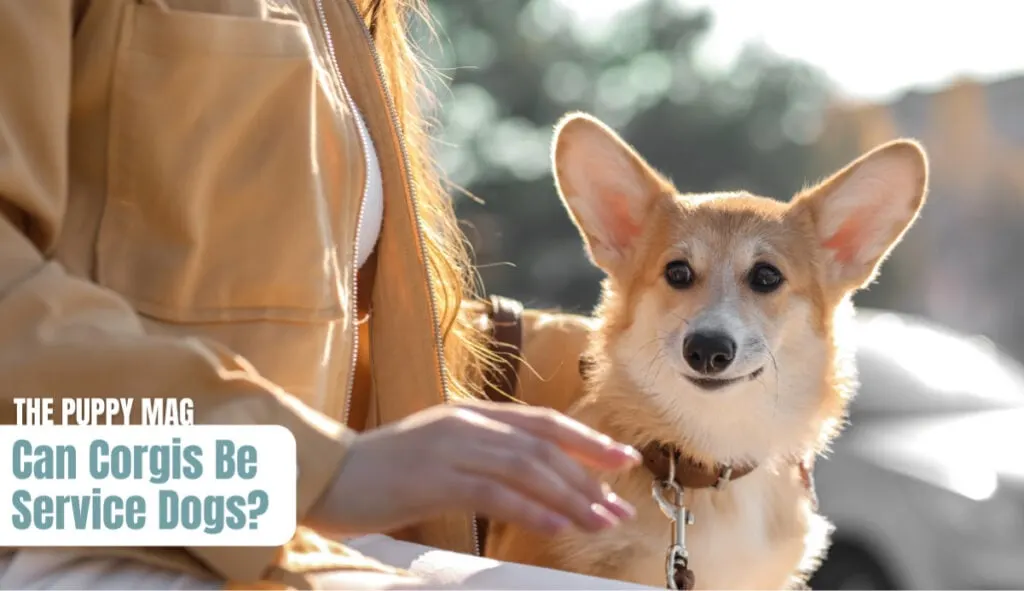As our corgi readership grows, I’m receiving more questions about whether corgis can be service dogs and/or emotional support dogs.
This is a common question with an interesting answer, so let’s explain everything an owner would need to know below.

Can Corgis Make Good Service Dogs?
Although many people don’t associate corgis with being service dogs, they actually have many of the required traits to fulfill important service roles.
Of course, there are still some roles that may be better suited to larger, stronger dogs like labradors or german shepherds.
Corgis are able to be service dogs due to their high intelligence, acute awareness to their surroundings, consistent attentiveness to their owner, and their lack of fear in uncertain situations.
Can Corgis Be Emotional Support Dogs?
One role that many owners are particularly interested in is emotional support.
Corgis make excellent emotional support dogs and are known for growing strong bonds with their owners. Corgis are happy to receive and give a lot of attention at all times.
This is perfect for anyone requiring consistent emotional support. A corgi will always be ready to lay beside their owner, sit on their lap, and even sleep along side them.
6 Reasons Why Corgis Make Good Service Dogs
Let’s clarify some of the qualities that corgis have that allow them to make good service dogs.
1. Corgis are highly intelligent
An absolute must for any “service dog” is to have high intelligence. Believe it or not, some dogs are extremely clever and others just aren’t!
Not only can corgis be trained to a high level, but they understand the situation they are in. When trained, corgis will understand what their role is, and will be consistently aware of their owner and surroundings to make sure everything is going to plan. Many breeds are not capable of this.
2. Corgis want their owners attention
To some extent, service dogs must also be dogs that love attention from their owner. Craving their owners attention makes them aware of their owner, and this is crucial to be a service dog.
Whenever you move, speak or do something, a corgi will want to know exactly what’s going on and will inspect the situation. Ultimately, this kind of behavior/reaction stems from craving your attention.
3. Corgis are obedient and patient
Sometimes, the service role of a dog could involve them waiting around for a while… Whether this is leading the blind, or simply showing emotional support for many hours on end.
A corgi will have no problem with this, if they need to wait by someone for a prolonged period of time they will do. Their overall obedience and patience is far greater than most breeds.
4. Corgis are courageous and fearless
Although they may not be able to save someone from a burning building, a corgi would certainly try! No doubt, corgis are one of the most courageous and tough dogs we know of… especially for their small size!
These little dogs will protect, serve, and do everything they can in uncertain situations to help their owner. This is absolutely necessary for most service roles like emotional support and leading someone through public places.
5. Corgis like to follow commands
It’s crucial that a service dog is capable of listening and obeying to commands the first time they are given, and corgis, have absolutely no problem with this.
Most breeds have some level of defiance and stubbornness in them, but a well-trained corgi will always be ready to carry out a command when given it. With a short amount of training, corgis are consistently obedient.
6. Corgis have excellent hearing
Another well-known fact about corgis is their ability to hear exceptionally well. Whether it’s someone approaching the house, or a small noise from another room, a corgi will be alert and ready to react.
This is obviously crucial for many roles, but in particular, helping deaf people navigate their surroundings and alerting them to what’s happening in their close environment.
The 5 Best Service Roles For Corgis
There are many different kinds of service roles for dogs, so which ones can corgis handle? Let’s list them below…
5 service roles that corgis would be great at:
- Emotional support dogs
- Allergy detection dogs
- Hearing dogs
- Autism alert dogs
- General working dogs (herding, farm work)
Some roles like seizure support, diabetic support, and guide dogs may be more suited to larger breeds that may need to use their physical size and strength in an emergency situation.
It’s crucial to always speak to a professional before taking on a service dog. Ensure you receive advice tailored to your specific situation so you choose the correct breed.
Raising a Corgi To Be a Service Dog
All service dogs must undergo extensive training before being relied upon to carry out their role.
Corgis must receive consistent training starting with the basics before moving on to specific drills to deal with certain situations.
Some breeds like labdradors and golden retrievers are known for learning very quickly. While corgis are highly intelligent, they would usually require more extensive training than other service dogs.
Relying upon a dog in a potentially dangerous situation is of course a very serious thing to consider. So as explained before, it’s necessary to go through professional channels to ensure the service dog is ready and capable.
Final Thoughts
Corgi are excellent dogs that have many of the required traits to be service dogs. The only thing that sets them apart from many service breeds is their smaller size, so this must be considered first.
Corgis are highly intelligent, obedient, courageous, patient, form strong bonds with their owners and always ready to give and receive attention.
Thank you for reading! Be sure to check out more corgi articles here
